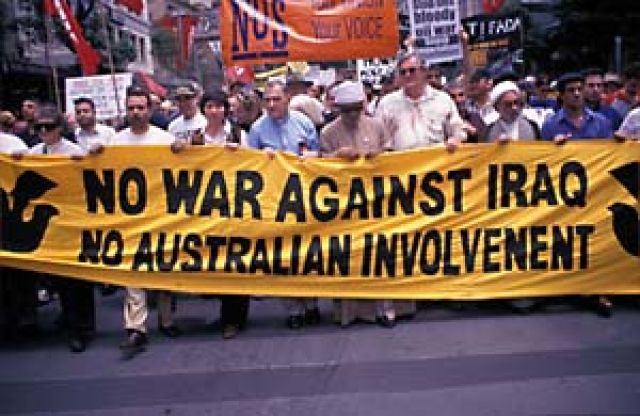
It took nearly six months to organise, but on May 21, representatives from seven anti-war groups finally met defence minister Senator John Faulkner to request he re-consider a Greens’ initiative to amend the Defence Act. The amendment would require that MPs vote on whether or not Australian troops are sent to war.
While the lobby, spearheaded by Nick Deane from the Marrickville Peace Group, did not change the senator’s mind, Deane told Green Left Weekly that he felt the exercise was still worthwhile because Faulkner heard a range of views.
Below is an abridged version of Dean’s opening remarks at the meeting. Faulkner insisted his not be reported.
Up until now, those with a vested interest in war and the armaments trade have had too much say in discussions about defence matters.
The primary reason we are here is to ask that you give further consideration to legislation that would require there to be parliamentary debate before the deployment of any Australian forces overseas.
Greens Senator Scott Ludlam introduced his Defence Amendment (Parliamentary Approval of Overseas Service) Bill in 2008, which had the objective of making such parliamentary debate obligatory. It was rejected by the Senate Committee.
You took part in the street rallies that preceded the invasion of Iraq in February 2003. Just before that invasion, you succeeded, as leader of the opposition in the Senate, in carrying an amendment to a House of Representatives resolution, expressing the Senate’s opposition to it.
Of course, you couldn’t stop what had already been decided — even with a majority in the Senate.
Had there been legislation in place along the lines of Ludlam’s bill at that time, then you could have delayed, and possibly even prevented, Australia’s involvement in the Iraq debacle.
Surely, in a democracy, a decision with such far-reaching implications as one to engage the country in acts of warfare overseas warrants debate by the people’s representatives?
We require debate on issues of much lesser weight. Why should this decision be one taken without it?
We contend that democratisation of any decision to commit armed forces to action outside our own territory is desirable. We also argue that it would reduce the possibility of rushed decisions, such as we saw with the invasion of Iraq — and thus increase long-term prospects of peace.
This all seems so reasonable and logical that we are at a loss to understand why the government is hostile to Ludlam’s bill.
A decision about going to war is of such importance that it should not be taken by any exclusive group without the matter first being debated in parliament — this is not seriously disputed by anyone.
None of us has a party-political axe to grind. Whether the legislation comes in the form of another private member’s bill from Ludlam or is proposed from the government makes no difference.
The majority of Australians are opposed to the war in Afghanistan and agree that we should never have got involved in Iraq. So moves to adopt legislation along the lines of Ludlam’s bill would be popular and might serve your party’s political interests.
We are not persuaded by quibbles over speed of response in an emergency or the possibility of intelligence reaching a potential enemy. Through skilful drafting of legislation, ways can be found to get around these difficulties.
The underlying principle is that a decision to commit armed forces overseas is so important it demands parliamentary debate. Collectively, we urge you to please look into ways to bring about the legislative change that is so necessary.
[The delegation included Stefania Siedlecky from the Women’s International League for Peace and Freedom; Stuart Rees from the Centre for Peace and Conflict Studies; Bianca Pace from the Ministry for Peace; Sue Wareham from the Medical Association for the Prevention of War; Peter Murphy from Sydney Peace and Justice Coalition; and Pip Hinman from the Stop the War Coalition.]